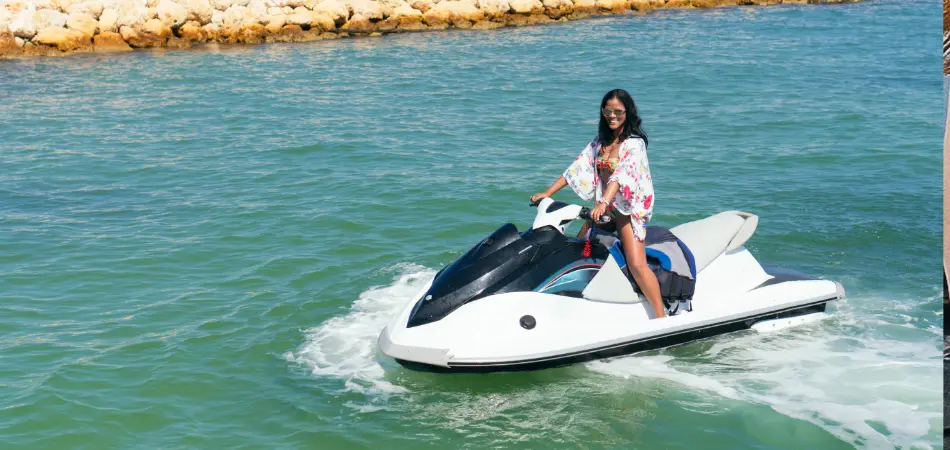9 Reasons Why Your Jet Ski Battery Is Dying

A battery that drains too fast can also drain your free time.
You bought your jet ski to recreate. To feel the wind and saltwater on your face.
But it’s time to investigate if you spend more weekends charging your battery than riding the ocean waves. Below, we list the most common reasons why your jet ski battery is dying and offer tips to prevent it from happening.
1: Battery Age
- Jet ski batteries typically have a lifespan of 3–4 years.
- Their lifespan can vary according to use and maintenance practices.
- Older batteries may not hold a charge well and can drain quickly.
- Replacement is your best bet if your battery is approaching the average lifespan.
2: Lack of Use
- Jet skis are meant to be ridden, not left in storage.
- If your jet ski has been idle for a long time, the battery may have drained completely.
- Regularly starting and running the engine can keep the battery charged.
- If you plan to store your jet ski, consider investing in a trickle charger to maintain the battery’s charge.
3: Corrosion
- Battery terminal corrosion can disrupt the electrical connection and drain your battery faster than usual.
- Salt water spray and improper storage conditions can contribute to corrosion.
- Regularly cleaning and inspecting the battery terminals can prevent this issue.
4: Too Many Accessories
- Most jet skis come with accessories like speakers, lights, and GPS systems.
- These can drain the battery quickly if left on.
- Turn off all accessories when you’re not using the jet ski, or consider investing in a secondary battery specifically for these accessories.
5: Improper Charging
- Overcharging or undercharging your battery can damage its cells and compromise its ability to hold a charge.
- Always follow the manufacturer’s instructions for charging your jet ski battery.
- Consider using a smart charger that will automatically adjust the charging process based on your battery’s needs.
6: Faulty Alternator
- The alternator charges the battery while the jet ski is running.
- A faulty alternator won’t charge the battery, leading to a drain.
- Regular maintenance and inspections can detect any issues with the alternator before they become serious problems.
7: Extreme Temperatures
- Extreme temperatures, both hot and cold, can affect the performance of your jet ski battery.
- Cold weather can reduce a battery’s power and lifespan.
- In hot weather, batteries can overheat and potentially explode if left on for too long.
- Storing your jet ski in moderate temperatures and using insulated sleeves or blankets can protect the battery.
8: Internal Battery Drain
- Some jet ski models have internal systems, such as clocks or alarms, that can drain the battery if malfunctioning.
- Regularly check these systems and ensure they’re not causing a problem.
9: Poor Maintenance
- Neglecting basic maintenance tasks such as regular inspections and keeping the battery clean can shorten its life.
- Follow the manufacturer’s maintenance schedule to keep your jet ski battery in good condition.
Tips to Extend Your Jet Ski Battery’s Life
- Store your jet ski in moderate temperatures and use insulated sleeves or blankets to protect the battery.
- Keep your battery terminals clean and free of corrosion.
- Start and run the engine regularly, especially if the jet ski is used sparingly.
- Turn off all accessories when not in use to prevent battery drain.
- Invest in a trickle charger for long periods of storage.
- Follow the manufacturer’s instructions for charging your battery.
- Regularly inspect and maintain your jet ski to catch any potential issues with the alternator or internal systems.
FAQs About Jet Ski Batteries
Q: Can I replace my jet ski battery myself?
Yes, as long as you follow the manufacturer’s instructions and recommended specifications.
Q: How do I know if my jet ski battery needs to be replaced?
Signs of a failing jet ski battery include difficulty starting the engine, slow cranking, and a shortened lifespan compared to previous batteries.
Q: Can I jumpstart my jet ski with a car battery?
No, the voltage and amperage are different. Using a car battery could damage your jet ski’s electrical system.
Q: How long can a fully charged jet ski battery last?
This depends on factors like age, use, and maintenance. On average, a fully charged battery can last 6–8 hours of continuous use.
Q: Is it okay to charge my jet ski battery while still connected to the engine?
No, this can cause problems with the engine and potentially damage both the battery and engine. Always disconnect the battery before charging.
Q: What’s the best type of battery for my jet ski?
That depends on the manufacturer’s recommendations. Generally, AGM (Absorbent Glass Mat) batteries are popular due to their durability and resistance to vibration.
Q: How often should I inspect my jet ski battery?
We recommend inspecting your jet ski battery at least twice a season. However, if you ride frequently or notice performance issues, you should check it more often.
Q: Can I store my jet ski outside during the winter?
Freezing can damage the battery. If outdoor storage is unavoidable, use an insulated battery cover and regularly check and maintain the battery’s charge.
Q: How can I tell if my battery charger is working correctly?
The charger should display the correct voltage and indicators for charging status. Also, after charging, measure the battery voltage with a multimeter; it should read between 12.6V and 12.8V for a fully charged battery.
Q: What should I do if my jet ski battery is leaking?
A leaking battery can be hazardous. Immediately disconnect the battery and handle it with care. Wear protective gloves. Don’t attempt to charge or use a leaking battery; instead, follow local regulations for disposal and replace it.
More Articles

0 Comments